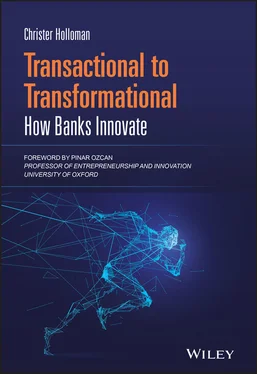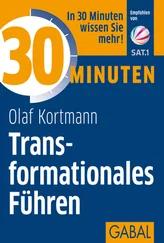They recognised that in order to realise this opportunity they would need to develop the Group's partnering capabilities; for example, creating a shared approach to pipeline development, getting the right tooling in place and building a group‐wide narrative around it. A particular critical part was determining the correct partnership structure for each opportunity.
To deliver their ambition they mobilised innovation working groups in each major part of the Group alongside a central fintech team. Together, these groups adopted a shared language and approach for pipeline management. Whilst this went some way to mobilising their pipeline, this consistent view also allowed them to identify common bottlenecks, which they needed to address to make the aggregate pipeline more robust.
Lloyds also used key pathfinder opportunities, such as their partnership with Thought Machine, to develop, surface and agree some important principles at more advanced stages of their pipeline. This included their equity investment rationale. Here they established two main principles: firstly, to only make investments where they expected to sustain a strategic relationship with a fintech; secondly, they required a clear articulation of the necessary strategic benefits of investment relative to what could be achieved through a commercial contract alone.
Whilst the bank acknowledges that it has more to learn and develop with regards to how to best invest in fintechs, the early results have been positive. Their capabilities in emerging technologies have been significantly advanced through this approach and several new customer services have been launched.
Do you want more details about this case? Find additional highlights from these interviews at www.howbanksinnovate.com.

Juan Gomez Reino, Group Chief Technology Officer
Juan has been the Chief Technology Officer for LBG since 2019. Juan joined LBG in November 2014, initially as the COO for Consumer Finance before moving into the Insurance division in May 2016 as Transformation Director. Prior to joining the Group, Juan held a number of senior roles at Santander UK and Banco Santander, latterly reporting to the CRO and COO with responsibility for balance sheet management, liquidity, funds transfer pricing and asset‐backed funding. Juan graduated from the International School of Economics Rotterdam in 1994 (BA in Economics and Business Administration), has an MSc in Finance from Universidad Autónoma de Madrid and a BSc in Mathematics from UNED. He is also an alumnus of Stanford University's Graduate School of Business.

Carla Antunes da Silva, Group Strategy Director
Since joining LBG in October 2015, Carla has led the work on the 2018–2020 Group Strategic Review and, prior to that, the work on the Bank of the Future, which served as the backdrop to the market announcement. She and her teams are responsible for supporting senior management with strategic decisions made at both the Group and Business Unit level and making recommendations to the Group on all areas of major strategic significance, such as mergers, acquisitions/disposals, joint ventures and partnerships. They manage the Group's relationships with shareholders, the analyst community and the wider investment community, and provide coverage of Group‐wide competitor analysis, which drives strategic decision‐making through insightful analysis of the industry and competitors.

Zak Mian, Group Transformation Director
Zak joined the Group in 1989 as a Business Analyst in IT. He is now Group Director for the Transformation division and is responsible for group‐wide Transformation and strategic change programmes across all their business areas and functions. Before his current appointment Zak was responsible for the Group's Digital Transformation and End‐to‐End Journey Transformation agenda, leading the strategic direction for digitising the front‐ and back‐end of the bank to deliver market‐leading customer propositions. Prior to this, he was Retail CIO for Lloyds UK Retail Banking for over three years.
Total assets: £900 billion
Number of customers: 30 million
Number of branches: 2,000
Number of employees: 60,000
(Approximate as of 2020)
LBG is one of the largest financial services groups in the UK, providing a wide range of banking and financial services, focused on personal and commercial customers.
The Group's main business activities are retail, commercial and corporate banking, general insurance, and life, pensions and investment provision. Services are offered through a number of brands including Lloyds Bank, Halifax, Bank of Scotland and Scottish Widows, and a range of distribution channels. This includes the largest branch network in the UK and a comprehensive digital, telephony and mobile services.
Since 2018, LBG has had their strategic priorities focused on the financial needs and behaviours of the customer of the future and they break it down into four themes:
Leading customer experience. In order to be the best bank for customers, they recognise that they must continue to adapt to changes in customer behaviour, technology‐driven competition and regulation. Their propositions must be reflective of heightened customer expectations for ease of access, personalisation and relevance, as well as the needs created by changing life patterns. In September 2020, their digital bank had 17.1 million active users.
Digitising the group. Their cost position and customer franchise are sources of competitive advantage. However, they are not complacent and realise they must further digitise the group to drive additional operational efficiencies, improve the experience of their customers and colleagues and allow them to invest more for the future. In addition, they must continue to simplify and progressively transform their IT architecture in order to use data more efficiently, enhance their multichannel customer engagement and create a scalable and resilient infrastructure.
Maximising the group's capabilities. To better address their customers' banking and insurance needs as an integrated financial services provider and improve their overall experience, they want to make better use of their competitive strengths and unique business model.
Transforming their ways of working. Their colleagues are crucial to the success of their business. In order to deliver their transformation during the current strategic plan and beyond, their colleagues will require new skills and capabilities to reflect the changing needs of the business as it adapts to the evolving operating environment. At the same time, colleague expectations of their employers are changing. As a result, they are making their biggest ever investment in colleagues to ensure that they continue to attract, develop and retain these skills and capabilities, while fostering a culture that supports a way of working that is agile, trust‐based and reinforces the group's values.
To deliver this ambitious transformation, LBG increased its strategic investment to more than £3 billion over the plan period.
Читать дальше














